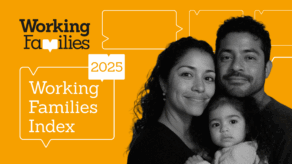Could the Autumn Budget offer the help struggling families need?
Published: 25 Oct 2024

By Simon Kelleher, Head of Policy & Influencing at Working Families
Labour’s first budget presents a key opportunity for the new government to make a real and direct impact on the lives of ordinary families across the UK. Our helpline has seen a marked increase of people asking advice on how to navigate the childcare system and how to increase household income in these trying times. Having asked the Chancellor to consider key areas where we think the government could make a significant difference to those struggling most, we’ll be watching closely for announcements that could improve the situation for those struggling in the here and now.
Childcare, both the cost and availability, continues to be a huge obstacle for parents. We hear every day on our helpline about the financial burden and the challenge of finding suitable childcare that is affordable. Childcare is simply non-negotiable when you’re returning to work after having a baby, but for those parents who have been surviving on low rates of Statutory Maternity, Paternity or Shared Parental Pay, making the upfront payments needed to secure childcare are just not within the budget. The Flexible Support Fund can be a lifeline available for those on Universal Credit to cover the upfront costs of childcare, and yet, it does not extend to Universal Credit claimants returning from parental leave, only those who are increasing their hours.
Our 2023 Working Families Index found that 4 in 10 parents on a lower income went into debt to pay for childcare. Parents should not be faced with the decision to go into debt or give up work after they have a baby. Expanding the Flexible Support Fund to include those on Universal Credit returning from parental leave, not just those who increase their working hours, would ease the transition, avoid families going into unnecessary debt, and in some cases, enable parents who would otherwise forego their employment opportunities, to return to work.
Even for those who aren’t returning from parental leave, childcare is an ongoing battle. As one of our five key policy objectives, we will continue to campaign, alongside the Early Education & Childcare Coalition, for everyone to be able access quality, affordable childcare. Our hope is for an ambitious and fully funded initiative from the Government, to meet both current needs and increased demand in the future, to unlock the enormous potential of parents.
The Government’s commitment to reviewing parental leave within their first year of office was welcomed, and we hope that it will include statutory pay within its scope as well as leave. A review of the rates of pay for Statutory Maternity, Paternity, and Shared Parental Leave would be a start in recognising the work involved in bringing these woefully low rates up to an adequate standard in future. We know that currently parents aren’t taking the time they want to with their new babies, particularly those on lower incomes. Our 2023 Working Families Index found that 7 out of 10 lower-income mothers who didn’t have access to enhanced leave took less leave than they wanted to due to financial concerns, and lower income mothers were taking on average four months less leave than the UK average. Relieving the financial strain by ensuring Statutory Maternity, Paternity and Shared Parental Leave was affordable to take would mean mothers, fathers and partners could take the time they need with their baby, helping to foster healthy parent-child relationships and progressing gender equality.
By taking on these suggestions, the Government could not only nail its colours to the mast for working families but also demonstrate their commitment to improving the lives of ordinary parents and carers.

Working Families Index
The Working Families Index is the most comprehensive study of the experience of work and family life in the UK.

Our policy asks
An overview of Working Families’ key policy asks, focussing on five areas.